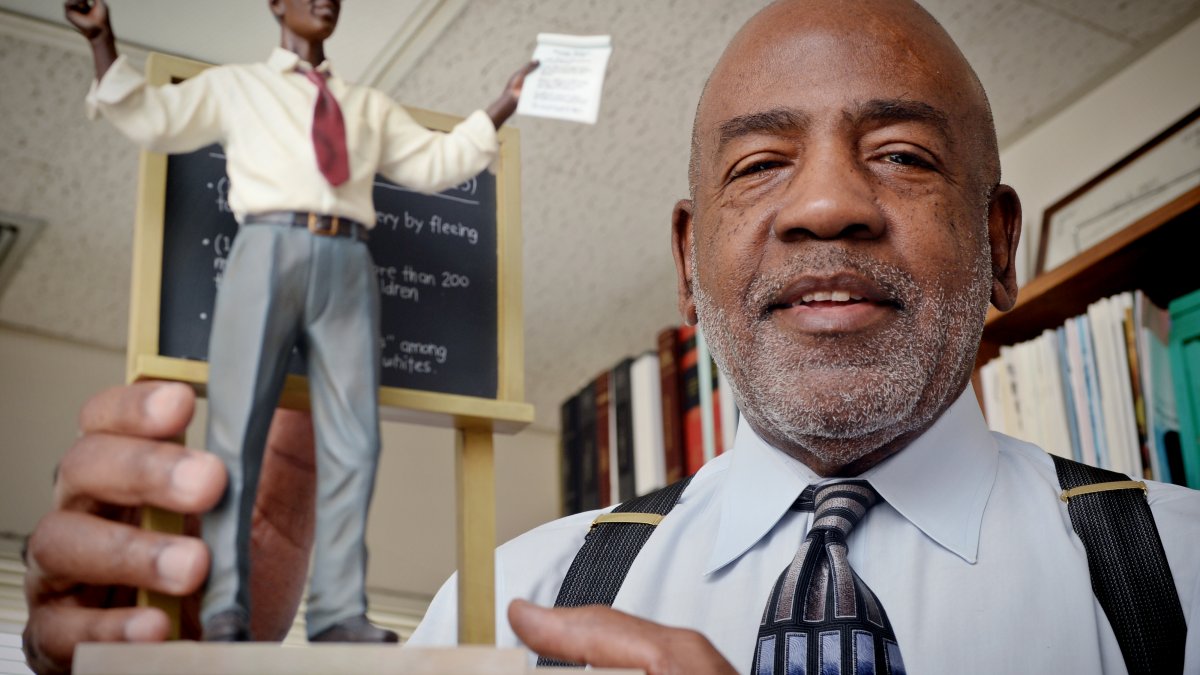‘Wisest man in the room’
Charles Daye has the “personality and the temperament that makes him the wisest man in the room,” says Jack Boger, the outgoing dean of Carolina’s School of Law.

Charles Daye has accomplished many things in his 70 years, but one task stands out as a source of recurring satisfaction.
“One of the things I like to do is mow my lawn,” Daye said. “The thing about it is, after you are done, you can look around and see the results immediately.”
As he steps away this month from a 42-year career as a law professor, he does so knowing that the full sweep of his work is one he will not live to see.
“There is an ancient Greek proverb that says, ‘A society grows great when old men plant trees whose shade they shall never sit in.’
“That spoke to me,” he said.
But one former student, Jack Boger, said Daye did not need to worry about his lasting impact and legacy.
“There are hundreds of former students who are now successful lawyers who can point to Charles Daye and the programs he started and say, ‘I would not have made it through law school if not for him,’” said Boger, the outgoing dean of Carolina’s School of Law.
Boger came to Carolina in the early 1970s as a former Yale divinity student ready to study law and became a student of Daye’s.
As a teacher, Boger said, “Professor Daye made you feel as if the law was something that was accessible to you.
“High quality and rigor characterized his teaching, but there was a humanity that came through along with his sense of the social dimensions of law. He brought you in as a junior colleague to think about law.”
When Boger joined the law school as a faculty member in 1990, he saw a deeper connection to Daye as a trusted colleague and friend.
“He has the personality and the temperament that makes him the wisest man in the room,” Boger said. “When faculty members would have meetings and difficult issues would arise, Charles had a way of contributing the most substantive judgments and yet doing so in a gracious, inclusive way that the situation demanded.”
An honors student at N.C. Central University and Columbia School of Law, Daye clerked for Chief Judge Harry Phillips of the U.S. Court of Appeals for the Sixth Circuit before entering private practice with Covington & Burling in Washington, D.C.
When he joined the law faculty at Carolina in 1972, Daye began a life of scholarship marked by extensive public service. He left Carolina in 1981 to serve as dean of the law school at N.C. Central before coming back to Carolina in 1985.
“I decided that academic life as a teacher was better than academic life as an administrator,” Daye said.
In the nearly 30 years since, he said he has never doubted that decision.
Daye’s curriculum vitae is impressive.
He has co-authored two books, “Housing and Community Development,” a course book now in its fourth edition, and “North Carolina Law of Torts,” now in its third edition.
He also has published articles, essays, book reviews and monographs on a variety of subjects including an empirical analysis of educational diversity, housing, state administrative procedure, torts, constitutional law, ethics in law school admissions, affirmative action and academic support programs.
In addition, he is the deputy director of the UNC Center for Civil Rights. For 15 years, he served as chair of the University’s Committee on Scholarships and Student Aid, and he has chaired the University’s Diversity and Multicultural Affairs Advisory Board.
The Law School Admission Council, which assists the nation’s law school admissions activities, named Daye to its board in 1988 and in 1991 elected him to a standard two-year term as president and spokesperson.
Faced with legal challenges to affirmative action admissions policies, the Association of American Law Schools drafted Daye to serve on a special Diversity Task Force in 1999 and a Joint Committee on Diversity in 2001.
In 2003, he helped co-author an amicus curiae brief for Carolina’s law school that he hopes helped persuade the U.S. Supreme Court to preserve affirmative action in college and university admissions.
Except during his four years at N.C. Central, Daye also has been the adviser to Carolina’s Black Law Students Association since 1972.
“The thing that absolutely makes this job worth doing is the opportunity to work with the students in the classroom and broadly in the academic enterprise,” Daye said. “That’s it. The rest of it is just the penance you have to pay for having the great privilege of being a law professor.”
In 2004, Boger said, he was honored to recite Daye’s impressive record of service as he read the citation for Daye when he received the Thomas Jefferson Award, which honors broad University service and an embodiment of Jefferson’s ideals. It is one of the highest distinctions the University can bestow on a faculty member.
He did so again in 2012, Boger said, when Daye was selected to receive the law school’s newly created annual service award. When Boger learned that Daye planned to retire at the end of the 2013–14 academic year, he knew that the award itself should bear Daye’s name.
To universal law faculty acclaim, Boger announced in April that the award would henceforth be known as the Charles E. Daye Award for Excellence in Faculty Service.
“Charles is, and will always be, the exemplar of what we hope our faculty will strive for,” Boger said.




